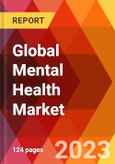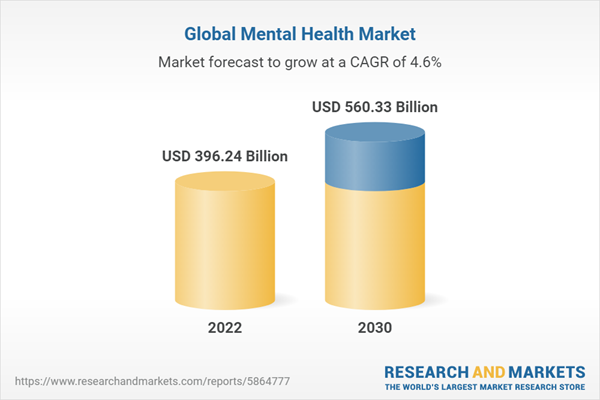The global mental health market held a market value of USD 396.24 billion in 2022 and is estimated to reach USD 560.33 billion by the year 2030. The market is anticipated to register a CAGR of 4.60% during the forecast period. Mental health encompasses a person's overall psychological well-being, including the absence of mental disorders and the stability of the mind. It involves having positive self-esteem, emotional resilience, the ability to regulate emotions, and the capacity to think clearly.The global mental health market held a market value of USD 396.24 billion in 2022 and is estimated to reach USD 560.33 billion by the year 2030.
Growth Influencers:
Increase in the prevalence of mental disorders:
The increase in the prevalence of mental disorders has significantly impacted the mental health market. Factors contributing to this rise include improved awareness and understanding of mental health, changes in diagnostic criteria, and shifts in societal and environmental factors. There has been a considerable demand for mental health services as more individuals are seeking expert help, including therapy, counseling, and psychiatric services, to address their mental health concerns. This increased demand has led to the growth of mental health service providers and expanded access to care. For instance, in 2021, the market observed considerable growth as limits related to the pandemic were lifted, and healthcare activities resumed at their normal pace. The increased prevalence of mental illness and behavioral disorders among the U.S. population led to the increased adoption of these services in the country. Major players also witnessed growth in their revenue from the behavioral health segment due to increased demand for such services.Rising Geriatric Population:
The rising geriatric population significantly impacts the mental health market. As individuals age, they may experience various mental health challenges and a higher occurrence of mental disorders. The aging process can bring about mental health issues such as depression, anxiety, cognitive decline, and dementia. The growing geriatric population leads to a rising demand for specialized mental health services tailored to the needs of older adults. This includes geriatric psychiatry, memory clinics, counseling services, and other forms of therapy that address the different mental health concerns of the population. In September 2022, San Francisco-based company, Osmind, rationalized its electronic health record system for mental health clinicians and integrated Zoom virtual visits in the technology as part of the company's regulatory-compliant ISV Partner Program. Thus, such developments make mental health services available for people from all over the globe, regardless of their demography.Segments Overview:
The global mental health market is segmented into Mental Disorders, Treatment Techniques, and Patient Groups.By Mental Disorder
- Mood Disorders
- Anxiety Disorders
- Personality Disorders
- Psychotic Disorders
- Eating Disorders
- Trauma-related Disorders
- Substance Abuse Disorders
- Others
By Treatment Techniques
Intervention Counselling
- Individualized therapy
- Group therapy
- Family counseling
- Discharge planning
Psychological Intervention
- Cognitive behavioral therapy (CBT)
- Dialectical behavior therapy (DBT)
- Medication evaluation and management
- Psychotherapy
- Trauma therapy
- Dual diagnosis treatment
By Patient Group
- Pediatric
Adult
- Adults in Workforce
- Non-Working Adults
- Geriatric
Regional Overview:
By region, the market is divided into North America, Europe, Asia Pacific, Middle East and Africa, and South America.North America
- US
- Canada
- Mexico
Europe
- Western Europe
- UK
- Germany
- France
- Italy
- Spain
- Rest of Western Europe
- Eastern Europe
- Russia
- Poland
- Rest of Eastern Europe
Asia Pacific
- China
- India
- Japan
- Australia & New Zealand
- South Korea
- ASEAN
- Rest of Asia Pacific
Middle East & Africa
- UAE
- Saudi Arabia
- South Africa
- Rest of MEA
South America
- Brazil
- Argentina
- Rest of South America
Competitive Landscape:
The global mental health market is a highly competitive market with key players including Acadia Healthcare, The MENTOR Network, Universal Health Services, Inc., Behavioral Health Network, Inc., CareTech Holdings PLC, Ascension Seton, and Pyramid Healthcare, among other prominent players.In October 2022, Calm, a subscription-based app, launched its first foray into a clinical mental health platform called Calm Health. This app provides condition-specific programs designed to bridge the gap between mental and physical healthcare. The U.S. is witnessing a major shift of customers toward digital resources, with factors such as cost reduction, accessibility, and advanced equipment for patient monitoring being the primary drivers for this shift. The increasing demand and growing awareness among people have led prominent competitors and new entrants in the market to focus on introducing advanced and innovative digital tools to cater to patients requiring mental health treatments in the U.S., thus fueling the behavioral health market growth. For instance, in August 2021, Ginger announced a collaboration with Headspace to meet the rising demand for mental health care. This agreement will allow both companies to provide the world’s most accessible and complete digital mental health and well-being platform to patients suffering from mental disorders.
The global market report provides insights on the following pointers:
- Market Penetration: Detailed information on the market as provided by the major participants.
- Market Development: In-depth information on emerging markets. This report analyzes the market for various segments across geographies.
- Market Diversification: Exhaustive information about new products, untapped geographies, recent developments, and investments in the mental health market.
- Competitive Assessment: In-depth assessment of market strategies, products, and manufacturing capabilities of leading players in the mental health market.
- Product Development & Innovation: Detailed insights on upcoming technologies, research & development activities, and new product launches in the mental health market.
- Pricing Analysis: Detailed analysis of the pricing of various components used in the manufacturing process.
- Manufacturing Cost Analysis: Breakdown of costs associated with various components, unit cost analysis.
The global market report answers questions such as:
- What is the market size and forecast of the mental health market?
- What are the inhibiting factors and impact of COVID-19 shaping the growth of the mental health market during the forecast period?
- Which are the products/segments/applications/areas to invest in over the forecast period in the mental health market?
- What is the competitive strategic window for opportunities in the mental health market?
- What are the technology trends and regulatory frameworks in the mental health market?
- What is the market share of the leading vendors in the mental health market?
- What modes and strategic moves are considered suitable for entering the global mental health market?
Table of Contents
Companies Mentioned (Partial List)
A selection of companies mentioned in this report includes, but is not limited to:
- Acadia Healthcare
- The MENTOR Network
- Universal Health Services, Inc.
- Behavioral Health Network, Inc.
- CareTech Holdings PLC
- Ascension Seton
- Pyramid Healthcare
- Promises Behavioral Health
Table Information
| Report Attribute | Details |
|---|---|
| No. of Pages | 124 |
| Published | June 2023 |
| Forecast Period | 2022 - 2030 |
| Estimated Market Value ( USD | $ 396.24 Billion |
| Forecasted Market Value ( USD | $ 560.33 Billion |
| Compound Annual Growth Rate | 4.6% |
| Regions Covered | Global |









